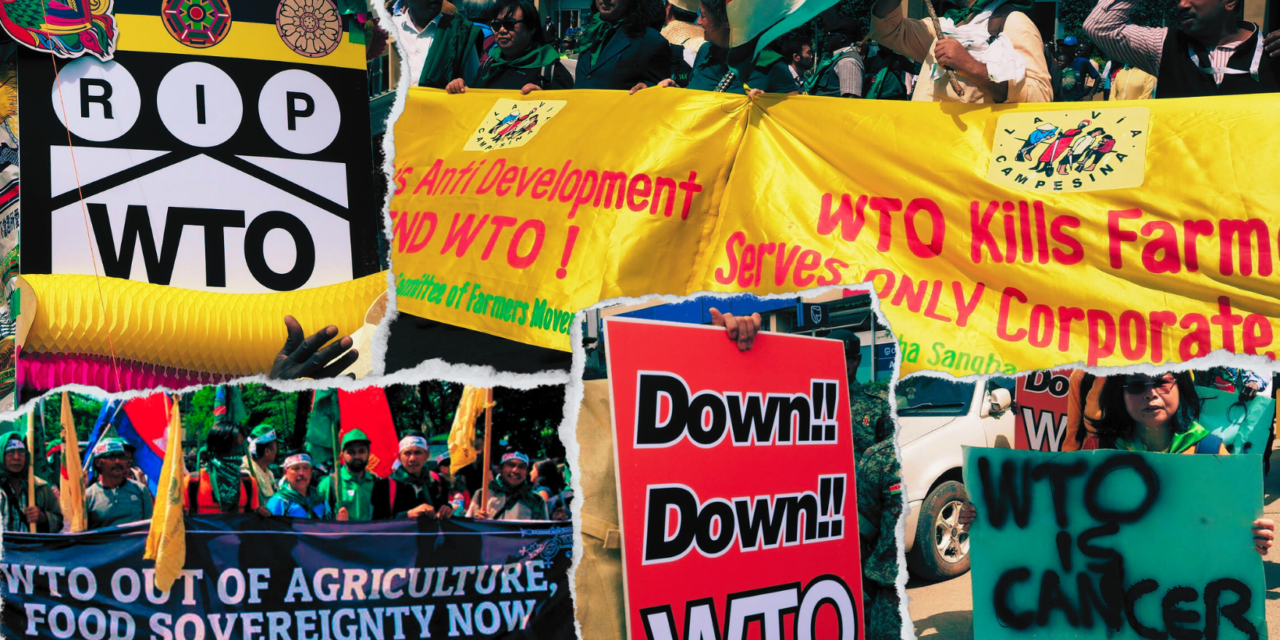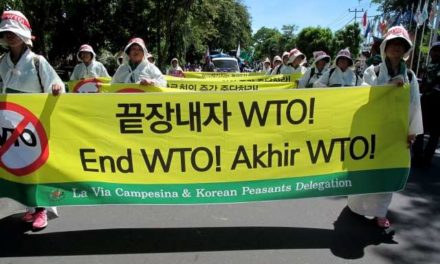Statement to the 13th WTO Ministerial Conference, Abu Dhabi
28 February 2024
The World Trade Organisation (WTO) is meeting in Abu Dhabi from 26-29 February 2024 for its 13th Ministerial Conference (MC13) when peasant unrest is being reported from across the world. Since January 2023, farmers have been protesting in at least 65 countries including Africa, Europe and Latin America. In Asia, more than 10 countries have witnessed mobilisations by peasants in the run-up to the four-day conference which will bring together delegates and Ministers from 164 countries to discuss issues related to fisheries, agriculture and digital trade.
In South Korea, the government is under fire from peasant groups for its policy on tariff reductions which has resulted in a massive influx of cheap agricultural products. They are arguing for more comprehensive institutional reforms including insulation of domestic markets from cheap imports, enhancement of food self-sufficiency through stabilising rice management, and production adjustment policies. Sri Lanka continues to reel from a multifaceted debt and economic crisis, but the government continues to import food with low nutritional value. Farmer groups in Sri Lanka are pressing on with their struggles and demands for guaranteed prices, and ramping up the neglected paddy marketing and storage boards.
In India, tens of thousands of farmers are again on the march to New Delhi, the national capital, holding the Government accountable for its broken promises and inability despite its attempts to secure the interests of Indian agriculture at the WTO. As India’s agrarian crisis deepens, reports indicate that there was a staggering farmer suicide every hour in 2022. The Samyukth Kisan Morcha (United Peasant Front), that is leading up the protests is demanding remunerative prices as a permanent solution at the WTO on India’s ability to maintain its public food stockholding programme.
Indonesia has seen a glut of rice imports in early 2024, just before the harvest season that begins in March. The Indonesian Peasant Union is on the streets demanding a stop to this baffling policy that will surely drive down farm gate prices and further bankrupt farmers. Farmers in Nepal are protesting that they cannot compete with imports of Indian vegetables. In the Philippines, Thailand and Japan, farmers are demanding that their respective governments enact policies that would improve their quality of life.
In addition to farm protests, fishworkers and artisanal fishers have been protesting across the region against the loss of livelihoods, depletion of fish resources, imports and the privatisation of coastal areas through projects framed under the Blue Economy, massive reclamation projects and seabed quarrying. As a counter to the corporate capture of oceans, the fishing community recently organised a people’s tribunal in 2022 where they highlighted issues such as ocean grabbing, dangers of extractive industries and deregulation of foreign investment to facilitate distant water fishing fleets and fishmeal factories.
Southern governments are unable to respond to these widespread crises and protests because of their flawed adoption of free trade and investment policies. They will again be on the backfoot at the WTO MC13. Since its founding nearly 30 years ago in 1995, developing countries have been on the defensive in all aspects of the WTO negotiations, a few pyrrhic victories in Seattle (1999) and Cancun (2003) notwithstanding.
In Abu Dhabi, once again a familiar script is playing out as the crisis-ridden WTO attempts to push its flawed and outdated agenda of trade liberalisation forward in areas such as fisheries subsidies, agriculture and services (especially in the arena of digital trade).
In the initial years, the WTO’s Agreement on Agriculture (AoA) was challenged from within by developing country coalitions such as the G20 and G33. The G20 coalition established in 2003 led by Brazil and India attempted to focus on market access for developing countries and also attacked the prevailing domestic support and export subsidies in developed countries. But both of these agendas proved to be a mirage. The experience of the past three decades has shown that developed countries continue to increase subsidies for their agribusiness interests while attempts by developing countries to secure market access has divided the South – as underlined by the collapse of the G20 coalition after 2004. The G33 coalition, with leadership provided by Indonesia and India, galvanised support for special safeguard mechanisms and special products to ensure food security and rural livelihoods in countries of the South. They have also, since 2013, pushed for a permanent solution to stop the attack on public stockholding programmes in developing countries. Despite these issues gaining traction among key countries in Africa, Asia and Latin America, relentless opposition from big agricultural exporting countries will most likely again derail efforts to achieve this in Abu Dhabi.
On the issues of fisheries, despite the Food and Agriculture Organisation (FAO) being the well established space to discuss issues around sustainability, new subsidy negotiations were foisted on developing countries at the 2001 Doha Ministerial. Here again, many proposals have been tabled by developing countries for 20 years to ensure that large industrial fleets in the North were curtailed, there was special and differential treatment for small-scale fishers in the South, and adequate policy space to protect the livelihoods of traditional fishworkers was maintained. Instead, we now have an unequal 2022 WTO Fisheries Subsidies Agreement that protects corporate fishing subsidies and provides for reverse special and differential treatment for the North.
For three decades, rather than highlight fundamental issues confronting the peasantry and fishing communities, negotiators from the South have been trapped in the logic of market access and unsuccessful attempts to discipline subsidies through WTO agreements. This farce must stop as free trade and WTO agreements so far have only served to destroy the livelihoods of hundreds of millions of peasants, fishers and workers in the Global South.
The way forward for the South is a path outside of the WTO. Developing countries should not proceed with any further negotiations and instead strengthen democratic fora and mechanisms in the UN such as the UNCTAD for promoting multilateral agreements that promote genuine economic development, cooperation, sustainable development and well-being of their populations. An alternative global trade framework based on the principles of food sovereignty, social justice, solidarity and internationalism is now more urgent than ever.
Endorsed by:
- Alyansa Tigil Mina — ATM (Philippines)
- All Nepal Peasants Federation — ANPFa, La Via Campesina (Nepal)
- Aniban ng mga Manggagawa sa Agrikultura — AMA (Philippines)
- Assembly of the Poor, La Via Campesina (Thailand)
- Association for Farmers Rights Defense — AFRD (Georgia)
- Bangladesh Agricultural Farm Labour Federation — BAFLF, La Via Campesina (Bangladesh)
- Bhartiya Kisan Union —- BKU, La Via Campesina (India)
- Bukluran ng Manggagawang Pilipinas — BMP (Philippines)
- Cholistan Development Council (Pakistan)
- Crofter Foundation (Pakistan)
- Dakila — Philippine Collective for Modern Heroism (Philippines)
- Ekologi Maritim Indonesia (Indonesia)
- FIAN (Indonesia)
- Focus on the Global South (Thailand, Philippines, Cambodia and India)
- Food Sovereignty Alliance (India)
- Franciscan Sisters of the Immaculate Conception (Philippines)
- Harri Jadojehad Committee (Pakistan)
- Hints/Sahita Institute (Indonesia)
- In Defense of Human Rights and Dignity Movement — iDEFEND (Philippines)
- Indian Coordination Committee of Farmers Movements — ICCFM, La Via Campesina (India)
- Indian Social Action Forum — INSAF (India)
- Indonesia for Global Justice — IGJ (Indonesia)
- Indonesia Traditional Fisherfolk Union — KNTI (Indonesia)
- Integrated Rural Development Foundation — IRDF (Philippines)
- Joshi-Adhikari Institute of Social Studies — JAISS (India)
- Ka Tribu ug ang Lasang (Philippines)
- Karnataka Rajya Raitha Sangha and Hasiru Sene — KRRS, La Via Campesina (India)
- Kilusan para sa Repormang Agraryo at Katarungang Panlipunan — KATARUNGAN (Philippines)
- Kissan Karkeela Organisation (Pakistan)
- Korean Peasants League, La Via Campesina (South Korea)
- Korean Peasant Women Association, La Via Campesina (South Korea)
- Labour Education Foundation (Pakistan)
- Lilak, Purple Action for Indigenous Women’s Rights — LILAK (Philippines)
- Movement for Land and Agricultural Reform — MONLAR, La Via Campesina (Sri Lanka)
- Nagkakaisang Magsasaka ng Gitnang Luzon — NMGL (Philippines)
- Oriang (Philippines)
- Pambansang Katipunan ng mga Samahan sa Kanayunan — PKSK (Philippines)
- Pambansang Koalisyon ng Kababaihan sa Kanayunan — PKKK (Philippines)
- PARAGOS Pilipinas, La Via Campesina (Philippines)
- Partido Lakas ng Masa — PLM (Philippines)
- Partido Manggagawa — PM (Philippines)
- Pakistan Kissan Rabita Committee, La Via Campesina (Pakistan)
- People’s Democracy Movement of Thailand — PDMT (Thailand)
- People’s Development Institute — PDI (Philippines)
- Philippine Alliance of Human Rights Advocates — PAHRA (Philippines)
- National Fisheries Solidarity Movement — NAFSO (Sri Lanka)
- Pagkakaisa ng mga Samahan ng Mangingisda PANGISDA-Pilipinas (Philippines)
- Puanifesto (Indonesia)
- Rural Initiatives for Community and Ecology Association – RICE (Sri Lanka)
- SANLAKAS (Philippines)
- Sentro ng Nagkakaisa at Progresibong Manggagawa — SENTRO ( Philippines)
- Serikat Petani Indonesia, La Via Campesina (Indonesia)
- Social Action for Community and Development – SACD (Cambodia)
- Southern Peasants’ Federation of Thailand – SPFT (Thailand)
- Tambuyog Development Center (Philippines)
- Tameer e Nou Women Workers Organisation (Pakistan)
- Thamizhaga Vivasayigal Sangam — TVS, La Via Campesina (India)
- The People’s Coalition for Fisheries Justice — KIARA (Indonesia)
- Transnational Institute — TNI (International)
- Trade Justice Pilipinas (Philippines )
- United Broiler Raiser’s Association — UBRA (Philippines)
- Vivasayigal Thozhilalargal Munnetra Sangam — VTMS (India)
- WomanHealth (Philippines)
- Worker’s Information Center — WIC (Cambodia)








